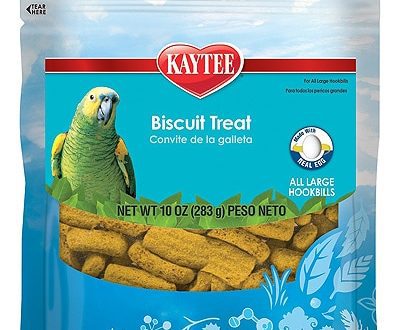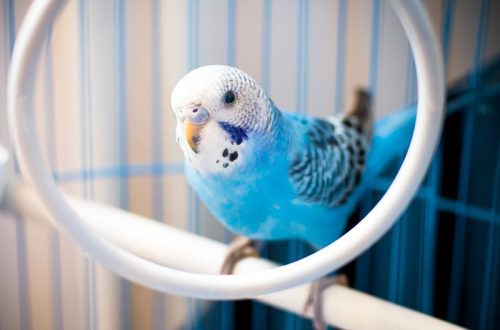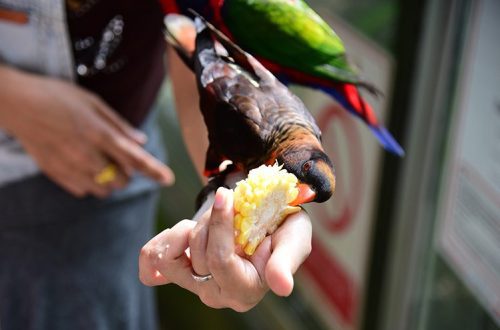
Parrot has a cold
In the wild, parrots travel great distances in search of food, endure heavy rains and are generally famous for their excellent health. Why, when kept at home, do they catch a cold from the slightest draft? How to protect your pet from colds?
Colds in budgerigars and other parrots are unfortunately a common problem. But the point is not that the parrot, for example, has weak immunity or the climate does not suit him, but in the wrong conditions of detention and the inexperience of the owner.
In fact, birds are reliably protected from temperature changes thanks to their plumage, which acts as a blanket. Depending on changes in air temperature, the parrot either presses the feathers to the body, or fluffs them, creating comfortable conditions for itself. But for such a “tuning” takes time. In natural habitats, the temperature changes gradually: from season to season and from day to night. It does not happen that it changes abruptly, within a few seconds. Thus, parrots have time to adapt to environmental changes and meet them fully armed. But when kept in captivity, sudden changes in t take place, for example, due to strong drafts and air conditioners.
Drafts are the main cause of colds in domestic parrots. Imagine the situation: the pet is warm and comfortable in its cage, but the windows suddenly open and a draft is created. The parrot is affected by a sharp temperature drop, which he did not expect and, accordingly, did not have time to prepare for it, and cold air passes through a practically unprotected body. The result – the parrot caught a cold.

Remember how often we catch a cold in winter, although we have warm jackets and hats on? A parrot does not have such protection, its body is under stress and responds to it with a cold. One draft is enough to make a bird sick. But in some apartments, ventilation (read: drafts) is a daily norm. Do not forget also about air conditioners, thanks to which warm air can change to cold (and vice versa) at the speed of light.
Improper transportation also provokes a cold. There are many cases when a parrot bought at a bird market in the cold season died as soon as it reached a new home. The reason is a sharp change in temperature, hypothermia and severe stress. The parrot was taken from a warm apartment, brought to the market, where he was waiting for new owners, and then taken to a new house. Temperature fluctuations are combined with severe stress, and the sensitive body cannot cope with the load. At best, the bird will catch a cold, at worst, it will die. Therefore, it is recommended to purchase parrots from conscientious breeders who keep them in the correct conditions, and transport them in a warm box, a warm car, or, in extreme cases, in the bosom.
It is very important to detect signs of a cold in a parrot in a timely manner and take action, otherwise his life will be in danger.
A parrot with a cold becomes lethargic, fluffs its feathers, breathes heavily, sneezes often, trembles, refuses to eat, discharge appears from its nose.
Symptoms may be solitary or appear all together. Do not wait until the disease gains full strength. If you think something is wrong with your parrot, contact an ornithologist right away. When it comes to health, it’s better to play it safe.

Prevention of colds in parrots is, first of all, the correct content: the absence of drafts, the remoteness of the cage from air conditioners and household appliances, high-quality balanced nutrition, fresh drinking water at room temperature, lack of stress, proper transportation.
In order for the parrot not to catch a cold, you need to maintain its immunity, monitor its health and not create conditions for hypothermia or overheating.
Noticing signs of malaise in a parrot, you need to contact a veterinarian as soon as possible. Any delay here is dangerous, since the symptoms in birds only appear when there is a problem. A parrot cannot “get a little sick” and heal on its own. Without timely treatment, a cold will give complications and will most likely lead to death.
To treat a severe cold, antibiotics and inhalations are prescribed for parrots. Trying to deal with the problem on your own, without the help of a specialist, is by no means worth it. If only because the signs of a cold can actually indicate another disease, for example, an infection. The symptoms of some diseases are very similar. Only a specialist can determine the exact cause and prescribe treatment.
To protect your pet’s health, always adhere to the conditions of detention and keep the contacts of the ornithologist at hand. Approach the care of the wards responsibly, and then they will not be afraid of any cold!





